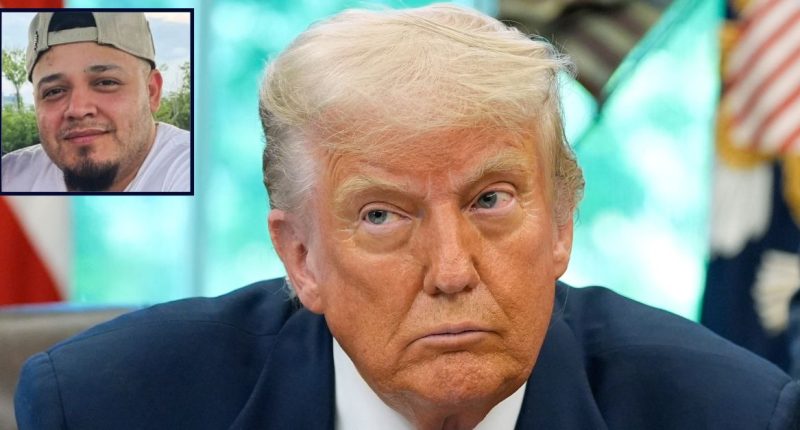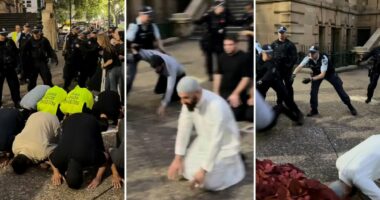Share this @internewscast.com
Inset: Kilmar Abrego Garcia in updated photo (CASA). Background: President Donald Trump converses with reporters while signing executive orders and proclamations in the Oval Office at the White House, Monday, May 5, 2025, in Washington (AP Photo/Alex Brandon).
Lawyers representing Kilmar Abrego Garcia, a Maryland resident who acknowledges he was “wrongfully” deported to El Salvador against court directives, are urging the presiding judge to abolish what they describe as ongoing clandestine practices.
In a 31-page memorandum of law concerning privilege claims, the attorneys are appealing to U.S. District Judge Paula Xinis to dismiss objections that enable the Trump administration to handle issues confidentially without the other party present and to file documents in secrecy.
The passage of time and the government’s admissions loom large in the heavily-redacted effort to bring transparency to the case.
The filing begins by noting that a “full month has passed since” the U.S. Supreme Court unanimously found that Abrego Garcia “was subject to a withholding order forbidding his removal to El Salvador, and that the removal to El Salvador was therefore illegal.”
Love true crime? Sign up for our newsletter, The Law&Crime Docket, to get the latest real-life crime stories delivered right to your inbox.
“Yet Abrego Garcia remains in El Salvador, and the Government has produced no evidence showing that it has made the slightest effort to facilitate his release,” the memo reads. “To the contrary, the President has insisted on national television that, although he has the power to bring Abrego Garcia back, he won’t, because his lawyers have advised him against it.”
In late April, in response to a question from ABC News, President Donald Trump said he “could” just pick up the phone and have the Salvadoran president return Abrego Garcia to the United States. But, Trump added, “we have lawyers that don’t want to do this.”
One of 19 attachments to the plaintiff’s filing — inclusive of 18 exhibits and one declaration — contains a brief transcript and write-up of Trump’s comments to ABC News anchor Terry Moran.
And that admission, Abrego Garcia’s attorneys say, flies in the face of the government’s efforts to otherwise maintain secrecy in court.
This juxtaposition comes as part of an ongoing bid to force the Trump administration into complying with discovery about “the truth as to the Government’s efforts (or lack thereof) as well as its abilities to facilitate Abrego Garcia’s return.” This, the plaintiffs insist, is “the essential issue” in the case.
“Over and over, the Government has stonewalled Plaintiffs by asserting unsupported privileges — primarily state secrets and deliberative process — to withhold written discovery and to instruct witnesses not to answer even basic questions,” the memo goes on. “Even as the Government speaks freely about Abrego Garcia in public, in this litigation it insists on secrecy.”
The attorneys argue the state secrets privilege is clearly not implicated by any of the facts in a case about “a single mistakenly removed individual” who is simply trying to get flown back to the United States “so that he can get his day in court.”
“No military or intelligence operations are involved,” the memo continues, “and it defies reason to imagine that the United States’ relationship with El Salvador would be endangered by any effort to seek the return of a wrongfully deported person who the Government admits never should have been removed to El Salvador in the first place.”
Aside from the basic thrust of the state secrets claim, the plaintiffs say the government has not even properly invoked the privilege.
Under relevant Supreme Court precedent from Global War on Terrorism cases, the memo notes, the privilege has to be invoked by department heads “based on actual personal consideration.”
In the present case, this entails the Department of Justice and the Department of Homeland Security (DHS). But, the plaintiffs say, neither department head has attempted to invoke the privilege. Instead, Secretary of State Marco Rubio submitted a national security declaration. And even Rubio’s declaration comes up short, according to Abrego Garcia’s legal team, because it lacks an argument that returning the man would result in a “reasonable danger of harm to national security.”
Again, the plaintiffs aim to juxtapose.
“The Rubio Declaration’s vague and boilerplate justifications do not satisfy this exacting standard,” the memo argues. “The fact that the Government has repeatedly publicized information — in congressional testimony, public interviews, and social media posts — about Abrego Garcia and its unwillingness to facilitate his return confirms that answering the requested discovery would not imperil national security. More likely, the Government’s assertion of state secrets is consistent with an effort to avoid judicial scrutiny of its actions.”
For weeks, several documents in the case have been filed under seal and with redactions. Some information has apparently been withheld entirely. Meanwhile, the government has been engaged in ex parte communications with the court. These conversations, necessarily, concern information the plaintiffs are not privy to.
But Abrego Garcia’s attorneys apparently have a good idea what the government’s attorneys are telling the judge in these secret talks.
“The fact that the Government has apparently suggested to this Court — belatedly, and in sealed ex parte communications — that it was working to secure Abrego Garcia’s return, even as senior officials from the President on down were saying precisely the opposite to the American public, underscores the skepticism that should be accorded the Government’s attempts to hide behind the state secrets privilege.
The memo goes on, at length:
Whatever it may be, the state secrets privilege is not for hiding governmental blunders or malfeasance. When read “with a very careful, indeed a skeptical, eye,” all that the Rubio Declaration indicates is that the Government is either seeking to avoid embarrassment or potentially covering up its defiance of court orders. But the state secrets privilege exists “to protect national security,” not to protect “government officials … or their associates from scrutiny” for mistaken representations or wrongdoing.
The late Monday filing — submitted overnight in Maryland federal court — also rubbishes the government’s invocation of the deliberative process objection. This objection provides a certain level of secrecy when the government wants to protect how it initially thought about solving a problem. Notably, how the government reached its final decision is generally considered beyond the scope of this protection.
Here, Abrego Garcia’s attorneys say the Trump administration has hardly even tried to support this secondary claim to secrecy. In fact, they say, the government missed an earlier, May 5, deadline to support their deliberative process claim — and have simply asserted the claim in conclusory fashion without any justification at all.
“By failing to submit any declaration or other evidence providing factual support for its assertion of deliberative process privilege, the Government has ‘los[t] the protections [it] failed to properly invoke,”” the memo argues. “Because the Government has failed to show the information it seeks to shield is both pre-decisional and deliberative, the Court should reject the assertion of the deliberative process privilege.”
Abrego Garcia’s attorneys insist neither of the two claimed privileges apply in this case — but offer a middle road. The plaintiffs ask Judge Xinis to review the information herself behind closed doors — or, “in camera” in legalese — and make a decision in instances where the court finds the privilege claims “to be a close question.”















